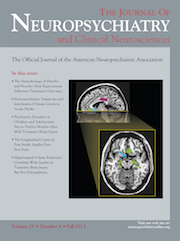To the Editor: Pellagra is a systemic disease resulting from decreased cellular niacin, clinically presenting with the diagnostic triad of dementia, diarrhea, and dermatitis (“the three Ds”). It is most commonly caused by dietary deficiency of niacin or its precursor tryptophan. In the early 20th century, pellagra was endemic in some of the southern states of America, where maize (a poor nutritional source of tryptophan and niacin) was the major food source.
The most widely reported central nervous system manifestation of pellagra is impaired cognitive functioning, with different types of dementia being described in patients, particularly in the later stages of the disease. Other neuropsychiatric symptoms that can present at any stage have traditionally been given little attention in the pellagra literature.
1 These include hallucinations, disturbances of thought, anxiety, and depression, as well as Parkinsonian motor features, such as
festinatio.
2 Here, we revisit the neuropsychiatry features described in two of the first landmark studies on pellagra in the United States.
To our knowledge, the first large-scale clinical and epidemiological evaluation of the psychiatric and behavioral aspects of pellagra in the American population was performed by Green in 1913.
3 This study was conducted on 131 patients with pellagra admitted to the Georgia State Sanitarium over a 20-month period (mean age: 37; range: 16–69) and showed that the average duration of psychiatric illness was 7 months, generally shorter than the duration of other pellagra symptoms. Over half of the patients were admitted with delirium, 12% with manic-depressive psychosis, and 11% with disturbances in cognition that would now be reclassified as schizophrenia. Affective and anxiety symptoms were also common, with 41% classified as having “depression” and 42%, “apprehensiveness.”
In 1915, Singer analyzed data from patients with pellagra from a larger population base, including patients seen in the community and at general hospitals in the states of South Carolina and Georgia.
4 Analysis of the case records of 130 patients with a diagnosis of pellagra demonstrated that psychiatric symptoms were present in 40%. The most common behavioral symptoms were depression and delirium, occurring in 31.5% and 7.7% of patients, respectively. This study also showed that the frequency of psychiatric symptoms was higher in patients with more severe forms of pellagra. Furthermore, psychopathology was shown to be approximately 75 times more prevalent in patients with pellagra than in the general population.
These early descriptions demonstrate that the biochemical abnormalities underlying multisystemic dysfunction in pellagra can result in the expression of specific behavioral symptoms, in addition to cognitive problems. Since niacin and tryptophan are precursors to NAD(H), it has recently been proposed that energy failure due to decreased ATP production may underlie the pathophysiology of pellagra.
5 The behavioral symptoms described in patients with pellagra tend to be transient and run a parallel clinical course to other symptoms of pellagra, thus suggesting that energy failure may underlie their development. Specifically, these historical reports highlight the need to reassess the widespread effects of alterations in NAD(H) metabolism, with focus on the possible influence on serotonergic pathways regulating affect.

